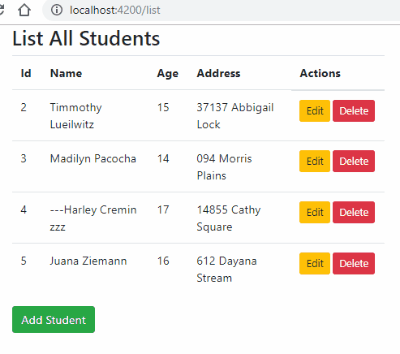Adding a HTTP header to the Angular HttpClient doesn't send the header, why?
AngularHttp HeadersAngular HttpclientAngular Problem Overview
Here is my code:
import { HttpClient, HttpErrorResponse, HttpHeaders } from '@angular/common/http';
logIn(username: string, password: string) {
const url = 'http://server.com/index.php';
const body = JSON.stringify({username: username,
password: password});
const headers = new HttpHeaders();
headers.set('Content-Type', 'application/json; charset=utf-8');
this.http.post(url, body, {headers: headers}).subscribe(
(data) => {
console.log(data);
},
(err: HttpErrorResponse) => {
if (err.error instanceof Error) {
console.log('Client-side error occured.');
} else {
console.log('Server-side error occured.');
}
}
);
}
and here the network debug:
Request Method:POST
Status Code:200 OK
Accept:application/json, text/plain, */*
Accept-Encoding:gzip, deflate
Accept-Language:en-US,en;q=0.8
Cache-Control:no-cache
Connection:keep-alive
Content-Length:46
Content-Type:text/plain
and Data are stored in 'Request Payload' but in my server doesn't received the POST values:
print_r($_POST);
Array
(
)
I believe the error comes from the header not set during the POST, what did I do wrong?
Angular Solutions
Solution 1 - Angular
The instances of the new HttpHeader class are immutable objects. Invoking class methods will return a new instance as result. So basically, you need to do the following:
let headers = new HttpHeaders();
headers = headers.set('Content-Type', 'application/json; charset=utf-8');
or
const headers = new HttpHeaders({'Content-Type':'application/json; charset=utf-8'});
Update: adding multiple headers
let headers = new HttpHeaders();
headers = headers.set('h1', 'v1').set('h2','v2');
or
const headers = new HttpHeaders({'h1':'v1','h2':'v2'});
Update: accept object map for HttpClient headers & params
Since 5.0.0-beta.6 is now possible to skip the creation of a HttpHeaders object an directly pass an object map as argument. So now its possible to do the following:
http.get('someurl',{
headers: {'header1':'value1','header2':'value2'}
});
Solution 2 - Angular
To add multiples params or headers you can do the following:
constructor(private _http: HttpClient) {}
//....
const url = `${environment.APP_API}/api/request`;
let headers = new HttpHeaders().set('header1', hvalue1); // create header object
headers = headers.append('header2', hvalue2); // add a new header, creating a new object
headers = headers.append('header3', hvalue3); // add another header
let params = new HttpParams().set('param1', value1); // create params object
params = params.append('param2', value2); // add a new param, creating a new object
params = params.append('param3', value3); // add another param
return this._http.get<any[]>(url, { headers: headers, params: params })
Solution 3 - Angular
set http headers like below in your http request
return this.http.get(url, { headers: new HttpHeaders({'Authorization': 'Bearer ' + token})
});
Solution 4 - Angular
I struggled with this for a long time. I am using Angular 6 and I found that
let headers = new HttpHeaders();
headers = headers.append('key', 'value');
did not work. But what did work was
let headers = new HttpHeaders().append('key', 'value');
did, which makes sense when you realize they are immutable. So having created a header you can't add to it. I haven't tried it, but I suspect
let headers = new HttpHeaders();
let headers1 = headers.append('key', 'value');
would work too.
Solution 5 - Angular
I was with Angular 8 and the only thing which worked for me was this:
getCustomHeaders(): HttpHeaders {
const headers = new HttpHeaders()
.set('Content-Type', 'application/json')
.set('Api-Key', 'xxx');
return headers;
}
Solution 6 - Angular
In the manual (https://angular.io/guide/http) I read: The HttpHeaders class is immutable, so every set() returns a new instance and applies the changes.
The following code works for me with angular-4:
return this.http.get(url, {headers: new HttpHeaders().set('UserEmail', email ) });
Solution 7 - Angular
First, you need to add HttpHeaders with HttpClient
import { HttpClient,HttpHeaders } from '@angular/common/http';
your constructor should be like this.
constructor(private http: HttpClient) { }
then you can use like this
let header = new HttpHeaders({ "Authorization": "Bearer "+token});
const requestOptions = { headers: header};
return this.http.get<any>(url, requestOptions)
.toPromise()
.then(data=> {
//...
return data;
});
Solution 8 - Angular
In my legacy app Array.from of prototype js was conflicting with angular's Array.from that was causing this problem. I resolved it by saving angular's Array.from version and reassigning it after prototype load.
Solution 9 - Angular
I was struggling with this as well. I used an interceptor, it captures the response headers, then clone the headers(since headers are immutable objects) and then sends the modified headers. https://angular.io/guide/http#intercepting-requests-and-responses
Solution 10 - Angular
Angular 8 HttpClient Service example with Error Handling and Custom Header
import { Injectable } from '@angular/core';
import { HttpClient, HttpHeaders, HttpErrorResponse } from '@angular/common/http';
import { Student } from '../model/student';
import { Observable, throwError } from 'rxjs';
import { retry, catchError } from 'rxjs/operators';
@Injectable({
providedIn: 'root'
})
export class ApiService {
// API path
base_path = 'http://localhost:3000/students';
constructor(private http: HttpClient) { }
// Http Options
httpOptions = {
headers: new HttpHeaders({
'Content-Type': 'application/json'
})
}
// Handle API errors
handleError(error: HttpErrorResponse) {
if (error.error instanceof ErrorEvent) {
// A client-side or network error occurred. Handle it accordingly.
console.error('An error occurred:', error.error.message);
} else {
// The backend returned an unsuccessful response code.
// The response body may contain clues as to what went wrong,
console.error(
`Backend returned code ${error.status}, ` +
`body was: ${error.error}`);
}
// return an observable with a user-facing error message
return throwError(
'Something bad happened; please try again later.');
};
// Create a new item
createItem(item): Observable<Student> {
return this.http
.post<Student>(this.base_path, JSON.stringify(item), this.httpOptions)
.pipe(
retry(2),
catchError(this.handleError)
)
}
....
....
Check complete example tutorial here
